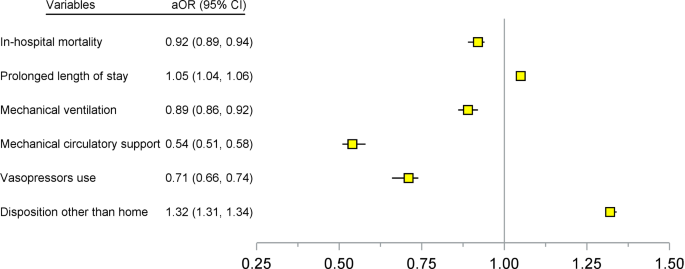7
Sex disparities in outcomes among hospitalizations for heart failure - Scientific Reports
www.nature.comThis study investigated sex differences in clinical characteristics and in-hospital outcomes of heart failure (HF) hospitalizations using the National Inpatient Sample data, 2016–2019. HF hospitalizations ≥ 41 years of age were included and stratified by sex. Study outcomes were in-hospital mortality, prolonged length of stay, mechanical ventilation, mechanical circulatory support, vasopressor use, and disposition other than home. Propensity score matched regression analysis was done to compare outcomes between sex. A total of 4,704,684 primary HF hospitalizations were included in the analysis. Of these, 2,447,784 (52.0%) were males and 2,256,899 (48.0%) were females. Regression analysis showed that females had significantly lower odds for mortality (aOR, 0.92, 95% CI: 0.89–0.94), mechanical ventilation (aOR, 0.89, 95% CI: 0.86–0.92), mechanical circulatory support (aOR, 0.54, 95% CI: 0.51–0.58), and vasopressor use (aOR, 0.71, 95% CI: 0.66–0.74), compared to males. However, the odds for prolonged length of stay (aOR, 1.05, 95% CI: 1.04–1.06) and disposition other than home (aOR, 1.32, 95% CI: 1.31–1.34) were significantly higher among females, compared to males. There were significant differences in outcomes between males and females hospitalized for HF. Further research is required to delineate how sex affects several aspects of HF, including epidemiology, risk factors, pathogenesis, and response to medications.
You must log in or register to comment.


